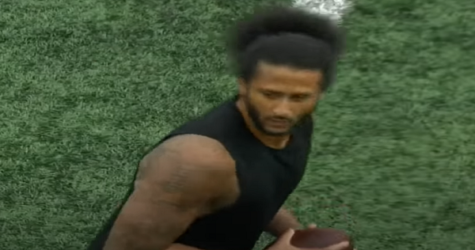
The act or art of kneeling as a cultural archetype has devolved into a viral theater congesting social media threads with a heaping side of grassroots ideology, or god help everyone, the resident homeless industrial complex of car camping content distributed by the corporatized press. As the nation now braces for a controversy which originated with a perpetually unemployed NFL quarterback jostling through the substrate of breaking every unwritten rule encompassing professional athletes, the First Amendment and the separation of church and state is currently being deliberated by the nation’s highest court.
At the intersection of the legal and cultural melting pot of social morays and steadfast beliefs is a pious and former assistant high school football who’s propensity to deftly descend to one knee in the aftermath of games apparently mortified Bremerton school district officials to a triggered hysteria of liberal guilt. Factoring in the Seattle influence, as the Kitsap peninsula is only geographically protected from the demilitarized zone of Space Needle nudist cyclists paying homage to the sun god Ra by Puget Sound and a pod of bad-tempered Orcas with a bloodlust for dogs wearing vests, the marine hazards cannot prevent the influx of extremist politics.
Unlike the snarky and defiant knee bend of his social justice warrior adversary and one-time San Francisco quarterback, Joe Kennedy would exercise his personal religious beliefs and take a knee for spiritual reflection in the aftermath of high school football games, and offer anyone to participate. In 2015, the wary school board became incited when a handful of residents filed official complaints with the district that students were probable victims of a religious zealot exploiting faith and indirectly pressuring pupils to forge a relationship with Jesus. Kennedy was ultimately fired from his coaching position from his postgame prayer groups, a deplorable and nebulous decision that is unfortunately a direct microcosm of the region’s political topography, where Christians and churches are often stigmatized as oblivious, hypocritical or worse. The beleaguered coach opted to utilize the legal system to fight for his Constitutional rights, and the Supreme Court decided to hear the case.
While freedom of religion remains a fundamental freedom, the complexities emanating from the prevalence of social networking, where billions are given an underserved platform has directly led to an influx of public commentary, and something as trivial as a the color of a stapler is brought to the attention of school leadership. Enter stage right a group of ace legacy justices and the untangling of policy nuance and defining shades of gray has commenced. Justice Stephen Beyer orchestrated this telling blanket statement during oral arguments, as the hearing lasted nearly two hours. “This doesn’t seem like a new problem,” he stated cryptically.
Disconcertingly, a group of local religious leaders traveled to the Washington, DC. to oppose Kennedy’s right to religious expression and made damming verbal claims that the pious behavior of Kennedy forcibly coerced students to participate or face the underlying implied threats of sacrificing playing time. or other team-related sanctions. The allegations swim in a mountain magma cavern of irony, considering the level of faith and dedication which is displayed in tending to each of their congregations. However, Kennedy remains undeterred considering the level of rhetoric originating from a frustratingly curious source.
While the case has garnered the attention of the nation, especially during tumultuous times as the world endures the Ukraine crises and glacially recovers from the Coronavirus pandemic, Kennedy gave sports broadcast behemoth ESPN an exclusive interview and explained the rationale and spiritually behind his choice to kneel after games. “I’d take a knee and thank God for what the guys just did and the opportunity to be a coach,” Kennedy remarked, “I wanted to hang out with my players and develop these young men.”
The country has reached a notable impasse, as the two kneelers diverge into the horizon of two dichotomous legacies polarizing the contrary perspective in each instance. A former coach searches for religious justification and solitude in hopefully reacquainting with student athletes, while a one-time Super Bowl quarterback attempts to detach with hyperbole and anti-law enforcement sentiment to earn another NFL paycheck. However, Kennedy’s quest for individual right in public spaces will set a precedent either way, in an controversial environment, where suppression and free speech are synonymous through the eyes of activists in achieving progress.
As the common theme is kneeling or “neiling” during a sporting event, one cannot help think about the homonyms to properly process the elicit humor, out of a dead serious issue that has weighed on society for far too long. Do the religious undertones of Kennedy’s histrionics conjure up visions of Niels Bohr or Neil Armstrong as a roots for the quest for latitudes surround religious expression, or do the references to Neil deGrasse Tyson, and Neil Peart encapsulate the blatantly egregious ECAB pig-monogramed stocking donned on the sidelines while cops prevent fans from accosting the players represent a first-step to anarchy?
When it is said and done, Neil Diamond does his best to describe the current prevarications of the current administration and perplexing countercultural movement fracturing a nation, through his timeless performance with the legacy teary-eyed ballad in “neiling” to emotions and truth.
“Love on the rocks
Ain’t no surprise
just pour me a drink
And I’ll tell you some lies
Ain’t go nothing to lose
So you just sing the blues all the time”